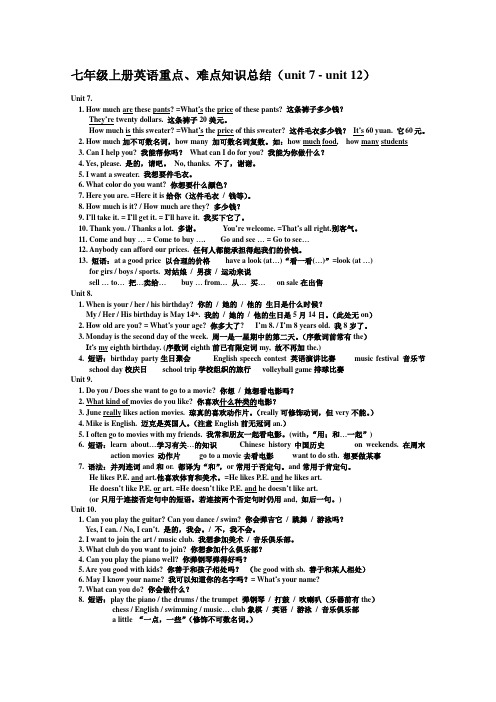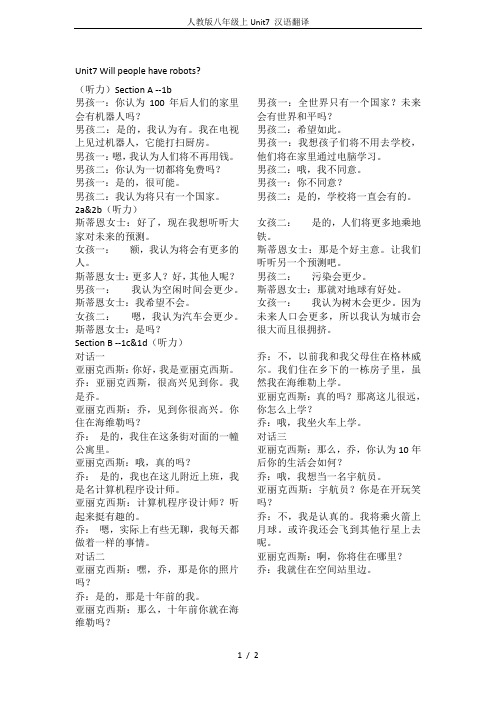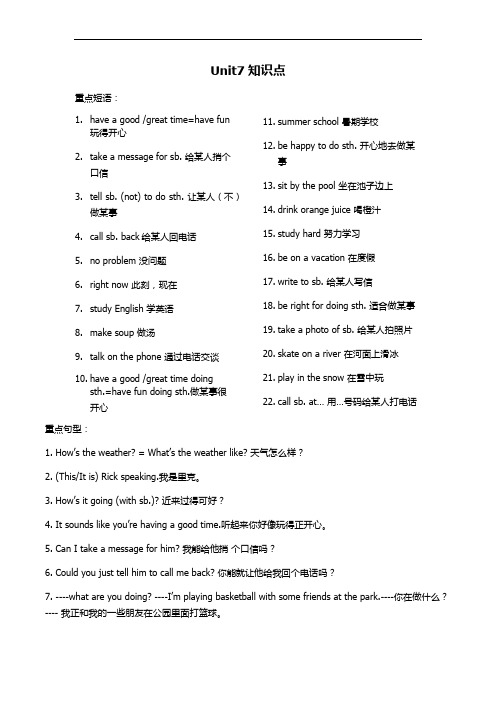Unit7--Unt12课文译文及Unit7重点句子
- 格式:doc
- 大小:32.00 KB
- 文档页数:2

UNIT71. Several leading modern business leaders seem, surprisingly, to downplay the importance of strategy. You can make too much fuss about strategy, they imply--- you have a few clear options; just choose one and get on with it. is it really that simple?2. “Strategy is straightforward---just pick a general direction and implement like hell.”Jack Welch, for example---the chairman and CEO of the USA’s General Electric Company; the man who grow the company from a market capitalization of $27 billion to a $140 billion, making GE the largest and most valuable company in the world. he must know a thing or two about strategy. But here’s what he says: “In real life, strategy is actually very straightforward. You pick a general direction and you implement like hell.”Or Allan leighton, the man who was recruited by Archie Norman to help res cue the UK’s ailing Asda supermarket chain, and went on to build the company into one of Britain’s most successful retailers. “Strategy is important,” says Leighton, “but it is a compass, not a road map. It tells you in which direction you are heading, but the important bit is how you get there.”Or Louis Gerstner, the man who rescued IBM in the 1990’s when the struggling mainframe supplier was about to be driven into extinction by the new, smaller and more agile personal computer manufacturers. “It is extremely difficult to develop a unique strategy for a company; and if the strategy is truly different, it is probably highly risky. Execution really is the critical part of a successful strategy. Getting it done, getting it done right, getting it done better than the next person is far more important than dreaming up new visions of the future.”3. So strategy is simple. And having an ingenious new strategy is less important than carrying it out successfully. In fact it might be dangerous. It that right?Let’s look at one last quote from Mr. Welch. “When I became CEO in 1981, we launched a highly publicized initiative: be number one or number two in every market, and fix, sell or close to get there. This was not our strategy, although I’ve often heard it descri bed that way.It was a galvanising mantra to describe how we were going to do business going forward. Our strategy was much more directional. GE was going to move away from businesses that were being commoditized toward businesses that manufactured high-value technology products or sold services instead of things.”Grand strategy versus strategy4. I would argue that these CEO’s blue chip corporations are taking a slightly Olympian view of the concept of “strategy.” Let’s call what hey are talking about “grand strategy” a strategy, but in the overarching sense, like the American car industry saying that they are going to move out gas-guzzlers and into smaller, more fuel-efficient models. 1.一些领先的现代企业领导人似乎,奇怪的是,淡化战略的重要性。

unit7-12知识点归纳Unit7-unit12知识点归纳Unit 7It’s raining!◆短语归纳1.not bad 不错2.at/in the park 在公园3.take a message for …为……捎个口信4.have a good time /have a great time /have fun /enjoy oneself 过得很愉快5.call sb.back 给某人回电话6.no problem 没问题7.right now=now 现在(进行时)8.right now=right away=at once 立刻、马上(将来时)9.some of ………当中的一些10.by the pool 在游泳池边11.sound like 听起来好像12.study hard 努力学习13.on a vacation 在度假14.in the mountains 在山里15.take a photo of sb.给某人拍照16.write to sb.给某人写信17.hear from sb.收到...的来信18.heavy/light rain 大雨、小雨19.leave a message 留言,留个口信20.rain cats and dogs 下倾盆大雨21.be on a vacation 在度假22.go on a vacation 去度假23.go skating 滑冰,溜冰24.go skiing 滑雪25.answer question 回答问题26.work out/solve the problem 解决困难◆用法集萃◆典句必背1.How’s the weather?天气怎么样?2.It’s cloudy./It’s sunny./It’s raining.天气多云。
/天气晴朗。
/天正下雨。
3.How’s it going?情况怎么样?4.Great!/Not bad./Terrible!好极了!/不错。

七年级上册英语重点、难点知识总结(unit 7 - unit 12)Unit 7.1. How much are these pants? =What’s the price of these pants? 这条裤子多少钱?They’re twenty dollars. 这条裤子20美元。
How much is this sweater? =What’s the price of this sweater? 这件毛衣多少钱?It’s 60 yuan. 它60元。
2. How much加不可数名词,how many 加可数名词复数。
如:how much food, how many students3. Can I help you? 我能帮你吗?What can I do for you? 我能为你做什么?4. Yes, please. 是的,请吧。
No, thanks. 不了,谢谢。
5. I want a sweater. 我想要件毛衣。
6. What color do you want? 你想要什么颜色?7. Here you are. =Here it is给你(这件毛衣/ 钱等)。
8. How much is it? / How much are they? 多少钱?9. I’ll take it. = I’ll get it. = I’ll have it. 我买下它了。
10. Thank you. / Thanks a lot. 多谢。
You’re welcome. =That’s all right.别客气。
11. Come and buy … = Come to buy …. Go and see … = Go to see…12. Anybody can afford our prices. 任何人都能承担得起我们的价钱。
13. 短语:at a good price 以合理的价格have a look (at…)“看一看(…)”=look (at …)for girs / boys / sports. 对姑娘/ 男孩/ 运动来说sell … to…把…卖给…buy … from…从…买…on sale在出售Unit 8.1. When is your / her / his birthday? 你的/ 她的/ 他的生日是什么时候?My / Her / His birthday is May 14th. 我的/ 她的/ 他的生日是5月14日。

人教版八年级上Unit7 汉语翻译Unit7 Will people have robots?(听力)Section A --1b男孩一:你认为100年后人们的家里会有机器人吗?男孩二:是的,我认为有。
我在电视上见过机器人,它能打扫厨房。
男孩一:嗯,我认为人们将不再用钱。
男孩二:你认为一切都将免费吗?男孩一:是的,很可能。
男孩二:我认为将只有一个国家。
男孩一:全世界只有一个国家?未来会有世界和平吗?男孩二:希望如此。
男孩一:我想孩子们将不用去学校,他们将在家里通过电脑学习。
男孩二:哦,我不同意。
男孩一:你不同意?男孩二:是的,学校将一直会有的。
2a&2b(听力)斯蒂恩女士:好了,现在我想听听大家对未来的预测。
女孩一:额,我认为将会有更多的人。
斯蒂恩女士:更多人?好,其他人呢?男孩一:我认为空闲时间会更少。
斯蒂恩女士:我希望不会。
女孩二:嗯,我认为汽车会更少。
斯蒂恩女士:是吗?女孩二:是的,人们将更多地乘地铁。
斯蒂恩女士:那是个好主意。
让我们听听另一个预测吧。
男孩二:污染会更少。
斯蒂恩女士:那就对地球有好处。
女孩一:我认为树木会更少。
因为未来人口会更多,所以我认为城市会很大而且很拥挤。
Section B --1c&1d(听力)对话一亚丽克西斯:你好,我是亚丽克西斯。
乔:亚丽克西斯,很高兴见到你。
我是乔。
亚丽克西斯:乔,见到你很高兴。
你住在海维勒吗?乔:是的,我住在这条街对面的一幢公寓里。
亚丽克西斯:哦,真的吗?乔:是的,我也在这儿附近上班,我是名计算机程序设计师。
亚丽克西斯:计算机程序设计师?听起来挺有趣的。
乔:嗯,实际上有些无聊,我每天都做着一样的事情。
对话二亚丽克西斯:嘿,乔,那是你的照片吗?乔:是的,那是十年前的我。
亚丽克西斯:那么,十年前你就在海维勒吗?乔:不,以前我和我父母住在格林威尔。
我们住在乡下的一栋房子里,虽然我在海维勒上学。
亚丽克西斯:真的吗?那离这儿很远,你怎么上学?乔:哦,我坐火车上学。

UNIT 7Section A1b Listen and write these city names in the boxes above.Conversation 1Tom: Hey,Peter.Peter: Hi, Tom.Tom: How’s the weather down there in Shanghai? Peter. It’s cloudy. How’s the weather in Moscow? Tom: It’s snowing right now.Conversation 2Peter: Hi,Aunt Sally.Aunt Sally: Hello, Peter.Peter: How’s the weather in Boston?Aunt Sally: Oh, it’s windy.Conversation 3Peter: So, how’s the weather in Beijing?Julie: It’s sunny.Conversation 4Peter: Hi, Uncle Bill.Uncle Bill: Hello, Peter.Peter: How’s the weather in Toronto?Uncle Bill: It’s raining, as usual!2a Listen and number the pictures[1-4]. Jim: Hello, Linda. This is Jim.Linda:Hello, Jim!Jim: Is Uncle Joe there?Linda: No, he isn’t. He’s outside.Jim: Out side? It’s cold, is n’t it?Linda: No, it’s sunny and really warm.Jim: What’s Uncle Joe doing?Linda: He’s playing basketball.Jim: Is Aunt Sally there?Linda: Yes, she is, but she’s busy right now.Jim: What’s she doing?Linda: She’s cooking.Jim: How abo ut Mary? What’s she doing?Linda: Not much. She’s only watching TV. You want to talk to her, don’t you?听录音,在上面方框中写出这些城市的名字。

Unit7知识点重点短语:1.have a good /great time=have fun玩得开心2.take a message for sb. 给某人捎个口信3.tell sb. (not) to do sth. 让某人(不)做某事4.call sb. back给某人回电话5.no problem 没问题6.right now 此刻,现在7.study English 学英语8.make soup 做汤9.talk on the phone 通过电话交谈10.have a good /great time doingsth.=have fun doing sth.做某事很开心11.summer school 暑期学校12.be happy to do sth. 开心地去做某事13.sit by the pool 坐在池子边上14.drink orange juice 喝橙汁15.study hard 努力学习16.be on a vacation 在度假17.write to sb. 给某人写信18.be right for doing sth. 适合做某事19.take a photo of sb. 给某人拍照片20.skate on a river 在河面上滑冰21.play in the snow 在雪中玩22.call sb. at…用…号码给某人打电话重点句型:1. How’s the weather? = What’s the weather like? 天气怎么样?2. (This/It is) Rick speaking.我是里克。
3. How’s it going (with sb.)? 近来过得可好?4. It sounds like you’re having a good time.听起来你好像玩得正开心。
5. Can I take a message for him? 我能给他捎个口信吗?6. Could you just tell him to call me back? 你能就让他给我回个电话吗?7. ----what are you doing? ----I’m playing basketball with some friends at the park.----你在做什么?---- 我正和我的一些朋友在公园里面打篮球。
1.选修七Unit1 MARTY’S STORY马蒂的故事Hi, my name is Marty Fielding and I guess you could say that I am "one in a million".你好。
我叫马蒂·菲尔丁。
我想你可能会说我是“百万人中才有一个”的那种人。
In other words, there are not many people like me. 换句话说,世界上像我这样的人并不多见。
You see, I have a muscle disease which makes me very weak, so I can't run or climb stairs as quickly as other people. 你瞧,我的肌肉有毛病,使我的身体非常虚弱,所以我不能像别人那样快跑快步爬楼梯。
In addition, sometimes I am very clumsy and drop things or bump into furniture. 再说,有时候我还会笨手笨脚、不小心摔掉东西,或磕碰到家具上。
Unfortunately, the doctors don't know how to make me better, but I am very outgoing and have learned to adapt to my disability. 不幸的是,大夫们不知道如何治好我的病,但是我很开朗乐观,学会了适应身体的残疾。
My motto is: live one day at a time. 我的座右铭是:活好每一天。
Until I was ten years old I was the same as everyone else. 十岁以前,我跟其他人是一样的。
I used to climb trees, swim and play football. 我常常爬树、游泳、踢足球。
人教版七年级上册英语 Unit 7 How much are these socks? 知识总结重点短语句型1. Can I help you ?= What can I do for you ?我能帮助你吗?2. (单数 )It looks nice. 它看起来很漂亮。
(复数) They look nice. 它们看起来漂亮。
3. three dollars for two pairs 两双三美元4. Here you are. 给你。
5. I ’ll take it/ them . 我将买下它 /它们。
6. -How much is the hat? 帽子多少钱?-It ’s five dollars. 它五美元。
7 .-How much are these socks socks? - They ’re two dollars. 这双袜子多少钱?两美元。
8. come and buy sth 来买某物Come/go to do sth 来 /去做某事9. at our great sale 商品大减价、大甩卖10. at good prices ( 复数 )/ at a good price( 单数 )以优惠的价格11. green sweaters for only 15$ 绿色毛衣仅售15 美元12. skirts in purple 紫色的短裙 sb/sth in + 颜色着某颜色的人 /物13. clothes store 服装店14. a pair of shorts/ trousers/ socks/ shoes 一双短裤 /长裤 /短裤 /鞋子15.基数词ten, eleven, twelve, thirteen, fifteen, nineteen, twenty,twenty-one,thirty/thirty-nine.10 ,11,12,13,15,19,20,21,30,e down to 到达,从一处来到另一处16.have a look at 看一看二、交际用语1、— How much is the bag? —这个包多少钱?— It ’ s ten yuan.10元。
你认为你将会有自己的机器人吗?
当我们看一些关于未来的电影时,我们有时看到机器人。
他们通常像人类的仆人。
他们帮助做家务并且做一些诸如脏的或危险的地方的工作。
现在已经有在工厂工作的机器人了。
一些机器人能帮助制造小轿车,他们反复的做简单的工作。
未来更少的人将做这样的工作,因为它们令人厌烦,但机器人将不会感到厌烦。
科学家们现在正尝试让机器人看起来像人类,并且做和我们相同的事。
日本的一些机器人能够走路和跳舞。
他们看起来很有趣。
然而,一些科学家相信,尽管我们能够使得机器人像人一样移动,但很难使他们真正像人类一样思考。
例如,科学家詹姆斯怀特认为机器人将不可能醒来并知道自己在哪里。
但是很多科学家不同意怀特先生的看法。
他们认为机器人在25年到50年后甚至将能像人类一样交谈。
一些科学家相信未来将有更多的机器人。
然而他们承认这可能需要数百年。
这些新的机器人将有很多不同的外形。
一些机器人将看起来像人,另外的机器人可能看起来像动物。
例如,在印度,科学家们制造看起来像蛇的机器人。
如果建筑物倒塌了人还在里面,这些蛇形机器人能够帮助寻找埋在建筑物下的人。
这在20年前是不可能的,但电脑和火箭在100年前也似乎是不可能的。
我们无法知道未来将发生什么。
两个世界之间他们是陌生人,但他们已经知道彼此的故事。
因此,当24岁的莫娜•拉曼告诉其他五位一起在纽约吃晚饭的同伴,她那级为严厉的父母从不让她在朋友家过夜时,引起大家会心的笑声。
32岁的格雷丝•张•卢卡莱丽拖着长腔、用柔和的德克萨斯口音回忆说:由于她是镇上为数不多的亚裔美国人之一,因此,“受到人们的嘲笑”,对此同伴们也是同情地、但更为严肃地点了点头。
围桌而坐的有的在德州农村长大的、新泽西郊区长大的,也有纽约州北部地区的,弗吉尼亚小城镇的和真正的橙子郡(加利福尼亚南部橙子郡)。
但他们的父母是从印度、菲律宾、韩国、孟加拉和中国移民到美国的。
他们所分享的,是那种像是亚裔-美国人这个词中连接着亚洲人和美国人的“那个连字符一样的感觉”,31岁的韩裔美国人叙泽特赢得哈斯说道。
直到40年前,即1965年,当林登•B•约翰逊总统签署了《移民和国籍法》时,他们的特殊身份才得到确认。
20世纪初的驱逐法使亚洲移民大量减少。
在1965年《民权法案》生效后,纽约大学社会学家勒米那・亚瑟说,"废除了移民法里的种族主义因素"。
涌入的移民抵达美国,苦苦寻觅其社会的位置,并最终被同化吸收,这些便构成了美国移民的故事。
但是1965年后移民来的亚洲人群体不同于更早移民来的西方犹太人、爱尔兰和意大利人。
亚洲移民的独特面貌可能使他们更加难以融入,但同时,他们的高等教育水平和高技能让他们更快的进入中产阶层。
他们不是紧紧聚集在城市内民族聚集区,而是分散到效区,在那里他们往往是孤立的。
正是在那儿(与外界世界隔离的郊区)他们的孩子长大成人,如今年龄在20至40岁之间,他们生活在两种社会之间:一个是不久前移民至此的父母在家中极力维持的传统领域,另一个是大门外社会里飞速变化的西方文化。
纽约大学移民历史学家大卫・瑞墨说,"65后这一代真的与众不同","同化速度要快得多"。
"模范少数民族"这一概念因这代人而生,他们主要由于学业上的巨大成就而得到认可,这也反映了他们父母追求某种成功的动力。